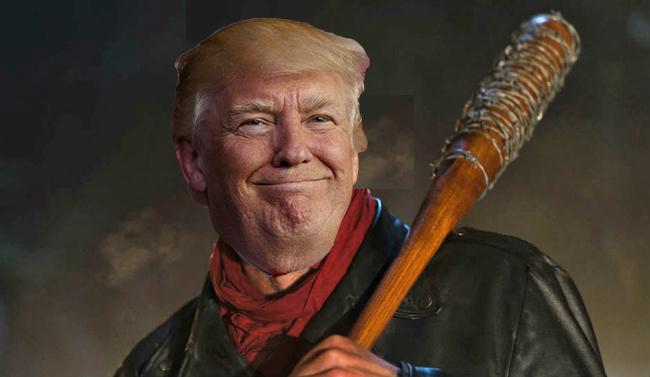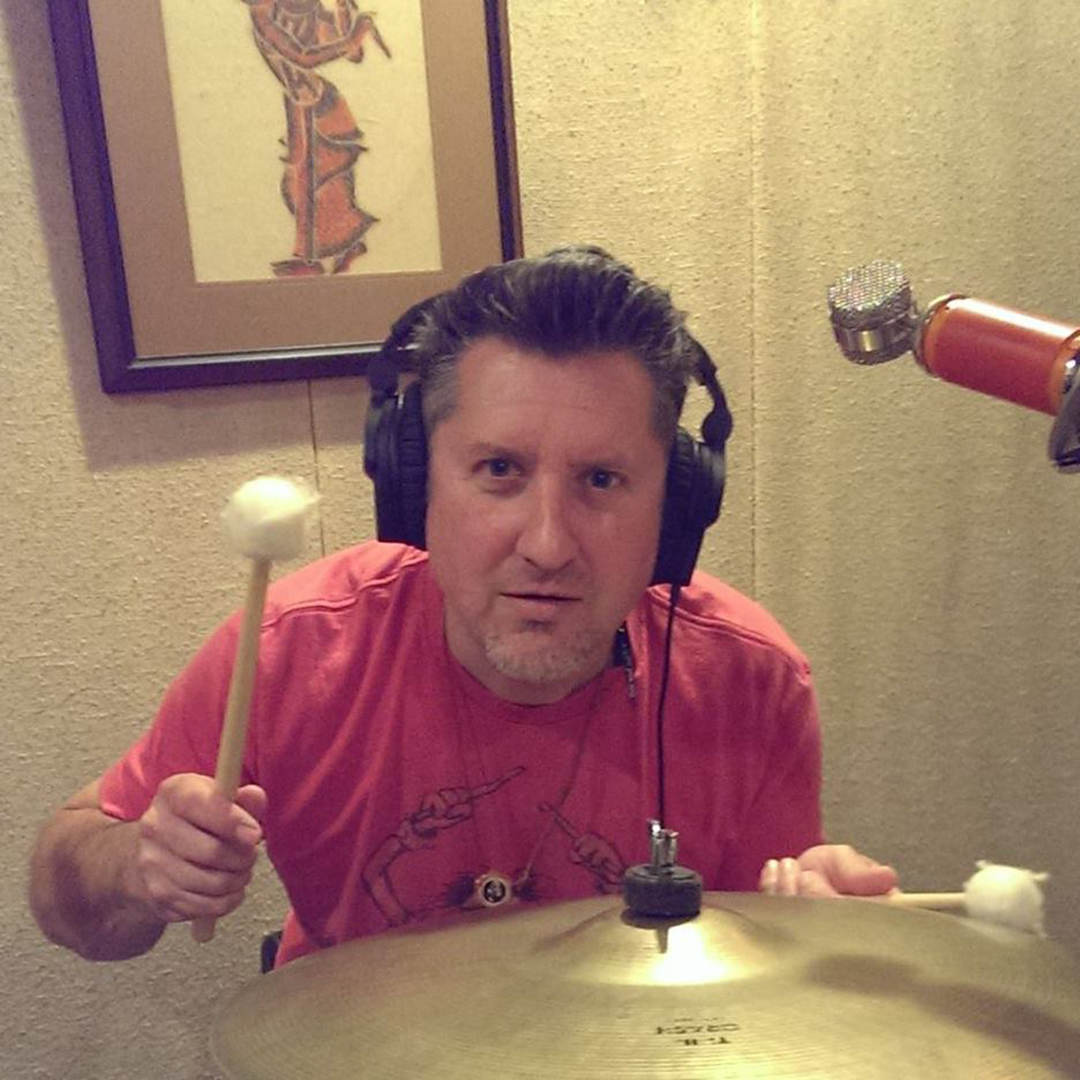We have a major zombie problem in the United States. If we don’t perish in nuclear “fire and fury,” can we learn to survive together again?
I recently devoured season seven of “The Walking Dead” on Netflix. Season eight began airing on AMC Oct. 22. If you’re unfamiliar with the show, it’s a about group of people in the southern U.S. trying to survive a zombie apocalypse.
After seven seasons, there’s no sign of the zombie crisis being solved. Countless zombies—aka walkers—still roam the countryside, and they don’t really change. Walkers exist for one purpose—to consume the living. They don’t contribute anything. They’re unredeemable. It’s a simple situation that’s easy to understand. Zombies must be killed.
While the walkers haven’t changed, the humans of the series have changed dramatically. They become more sadistic and savage with each passing season. It seems that fear of being consumed transforms people into monsters.
Spoiler alert: season seven opens as the current bad guy, Negan, beats two longtime characters to death with a barbed wire wrapped baseball bat named Lucille as their friends watch. He doesn’t just beat them. He liquefies their skulls into bloody puddles of broken flesh. I almost stopped watching the show because the first few episodes were so cruel and grotesque. I often feel the same way watching the news these days.
Shortly after “The Walking Dead” premiered on Halloween of 2010, Chuck Klosterman wrote, “My Zombie, Myself: Why Modern Life Feels Rather Undead,” examining the zombie craze for the New York Times. Klosterman writes, “When we think critically about monsters, we tend to classify them as personifications of what we fear.” He argues people are entertained by zombies because killing zombies reminds them of dealing with the never ending, overwhelming tasks of the digital age, like “reading and deleting 400 work emails on Monday morning” or “filling out paperwork that only generates more paperwork.”
In 2017, season seven of “The Walking Dead” is more violent and extreme because real life has become more violent and extreme. In today’s hyper-confrontational atmosphere, Americans are more openly hostile towards one another. Zombies no longer simply represent tedious, time consuming tasks; they represent opposition.
We have lost our ability to respectfully disagree, have conversations and engage in civil discourse. Derogatory names are unleashed in anger to objectify. Statistics are used to reduce people to numbers. As we dehumanize all “the other” people we feel threatened by, it’s becoming impossible to talk or reason with all of the monsters we perceive. We just want them gone from our lives.
Trump did not create divisions or monsters. Americans have always had differing views, but he is exploiting them and making them worse. Families have been divided along pro-Trump and anti-Trump lines. The president’s default position seems to be that there can be no other position. Differing views cannot be tolerated. Because his positions are often extreme, it makes it more difficult than ever to bridge the gap.
Trump shows a willingness to unleash weaponized language against anyone he disagrees with. The U.S. president has always had a bully pulpit, but never has a U.S. president been such a bully. Attacks are not limited to partisan lines. He’s goes after Republicans and even members of his own administration with equal venom.
A black athlete, who takes a knee during the National Anthem to protest racial inequality, is called a “son of bitch” who should be fired. If Trump actually listened to words of the National Anthem, he might find the overriding message of the song is that in the U.S., people are free not to stand and not follow. In “the land of the free, and the home of the brave,” people have the right to express their views even if they are unpopular or offensive if they are brave enough to face the consequences.
Trump and Negan share a similar approach to leadership. Negan is an authoritarian manipulator of people, who is quick to anger. He demands loyalty. When members of Negan’s group are asked who they are, they answer, “I am Negan.” Just as Trump proclaimed he alone could solve America’s problems, Negan and his people proclaim themselves to be “The Saviors.” Negan’s message can hold appeal for people who live in constant fear. He promises safety, security and comfort in return for obedience. In his own perverse way, Negan is also trying to make America great again.
Within the construct of the show, zombies are real. Negan does not have to create anything for people to fear. President Trump, on the other hand, must create and maintain a fear because people like Trump and Negan can only maintain power and control when people feel afraid and threatened enough to give away their freedom.
Trump has described a landscape of “American carnage” that more closely resembles “The Walking Dead,” than any America I’ve experienced. He sees an America under constant assault, in need of increased security and a wall. Like the conditions in the show where the only moderately safe places are isolated communities surrounded by walls and watchtowers. In Trump’s America cities are overrun by “crime and gangs.” This is true of the show as well. Trump says for “many of our citizens, a different reality exists.” One with a landscape of “rusted-out factories scattered like tombstones,” similar to the abandoned factories Negan’s Saviors use as their base of operation or that the good guys of the show retreated to in earlier seasons.
There are, however, some significant differences between “The Walking Dead” and Trump’s America. In the show, even though white males often hold much of the power, strong, independent women and people of color are similarly powerful, and they have repeatedly had to come the rescue after white men screwed up. Through seven seasons, race based hate is not an apparent issue. Interracial relationships are free from controversy. Even in the zombie world, however, same-sex relationships are still kept on the down low.
Trump characterizes immigrants from Mexico as monsters sent as part of a state sponsored invasion. He says, “When Mexico sends its people, they’re not sending their best… They’re bringing drugs. They’re bringing crime. They’re rapists.” He characterizes them as a threat to be feared.
His claims about immigration and crime have been repeatedly fact checked by numerous news organizations and found to be inaccurate and false. Even though the facts, data, and statistics do not support his positions, some people believe him because messages don’t have to be true to be effective. They just have to be transmitted and consumed.
We are inundated with messages. Exposure to a message on a television, phone or computer screen is all it takes for some people to believe it. Once this happens, regardless of facts or evidence, it’s difficult to convince someone that they are wrong.
Why does a white male billionaire, president of the United States, by most measures, the most powerful man in the world, want his citizens to be afraid of Mexican immigrants? These are some of the most vulnerable, least powerful people in society with little voice and limited legal leverage. How can a group with so little political power pose a threat to Trump and the richest most powerful country? Yes, some immigrants entered the country illegally. People are obviously free to oppose any and all legal immigration or path to citizenship, but why spend so much energy to dehumanize and demonize immigrants from Mexico?
Trump exaggerates and mischaracterizes immigrants because Trump needs people to feel afraid of and threatened by Mexicans, Muslims, Democrats, Republicans, black NFL athletes, war with North Korea, war with Iran and each other and whatever else.
It is in Trump’s best interest to cultivate ignorance and fear because when people are afraid, they are more likely to be obedient and unquestioning. As long Americans are overwhelmed by fear, they will remain too distracted by imaginary boogie men to demand real changes to a system plagued by complex issues that actually exist and require compromise, effort and sacrifice to solve. Changes to the system could become a threat to Trump’s power. He is less likely to be removed from office or face political challenges as long the U.S. is in continual crisis. White male billionaires are doing just fine with the status quo. As long as Trump keeps the government broken and maintains anger against the government, nothing will change.
Fear makes it easier to dismantle government. For proponents of deregulation, the zombie apocalypse of “The Walking Dead” is the ultimate Ayn Rand wet dream. It’s the epitome of a free market economy, a world free of government interference and red tape. The selfish can do as they please. Everyone is free to get away with as much as they choose. The population not only possess massive quantities of military style weaponry; their survival depends on it. There is no government supported health care or social safety net.
Trump has yet to build his “beautiful” border wall, but he was correct when he said, “Nobody builds walls better than me.” He has succeeded in building countless miles of virtual walls, which isolate people from one another. We now exist within virtual walled realities, isolated by ideology, motivated by fear and anger. In the postmodern, mass media age, computer algorithms and self-selection allow us to feed our ideology exclusively with information that supports our personal world view.
Unless Trump attempts overthrow the U.S. Government, or unless we all die in a nuclear war, he will eventually be gone. All of the division he is sowing will remain long after. It will be difficult to regain the ability to appreciate and tolerate other points of view. It will be more difficult to live with empathy. Resisting the temptation to use labels and numbers to dehumanize those whose politics and opinions we despise will never be easy, but it’s worth the effort.
Americans will always have disagreements, but we need to stop turning each other into zombies. This is our U.S. zombie problem, and we have to solve it to survive.



